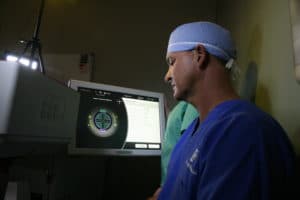
with the CATALYS Precision Laser
(Photo: Special to American)
Cataracts are one of America’s leading causes of blindness, gradually robbing people of sight later in life. June is Cataract Awareness Month and vision care providers like Hattiesburg Eye Clinic are raising awareness about this serious condition, as well as the amazing treatment advances of recent years that not only restore vision but in some cases improve it.
A cataract is essentially a protein buildup on the eye’s lens. As it develops a person may first notice blurred vision and sensitivity to light; later they’ll begin to experience a decreased sharpness in focus, as if they’re looking through a sheet of wax paper. This is because the cataract increasingly interferes with light passing through the eye lens to the retina in the back of the eye, which collects the light for transmission to the brain.
While heredity, trauma or smoking can all affect cataract growth, aging is the most significant factor according to Hattiesburg Eye Clinic’s Dr. Stoney Williamson.
“By and large, cataracts are a part of the aging process,” says Dr. Williamson, “Everyone has some level of development by age 50. Whether they should be removed, though, will depend on whether a person’s vision has deteriorated enough to interfere with daily activity.”
Removing the cataract, which also means removing the eye’s natural lens, is a surgical procedure that’s been performed for several decades. In the early years of Dr. Williamson’s five-decade long career, the procedure was performed manually with a scalpel. “The surgery took thirty to forty-five minutes for one eye and was performed in a hospital. We would then keep the patient overnight.”
Scalpels are more or less a thing of the past thanks to the advent of laser technology, with the CATALYS® precision laser system representing the very latest in that advancement. This state-of-the-art surgical laser, first offered in Mississippi by Hattiesburg Eye Clinic, is designed in every detail for cataract surgery. The system automatically performs nearly every step of the surgical procedure according to the patient’s individual eye measurements.
Systems like CATALYS® have not only dramatically changed cataract surgery – now a ten-minute outpatient procedure with eye drop anesthesia and no post-hospital stay – but they’ve also increased the accuracy of outcomes.
“Our philosophy at Hattiesburg Eye Clinic is to stay in step with these technological developments and adopt them as soon as possible as treatment choices for our patients,” says Dr. David Richardson. “Without them we’d return metaphorically to the ‘stone age’ of cataract care and patients wouldn’t have the precise vision outcomes enjoyed regularly today.”
Besides laser surgery, the intraocular lens (IOL) has also played a major role in better vision outcomes for cataract patients. An IOL is an implant device that replaces the eye’s natural lens removed during surgery. Before IOLs cataract patients depended on glasses to restore some of their vision after cataract/lens removal.
While the IOL concept is revolutionary in itself, Dr. Todd Williamson of Hattiesburg Eye Clinic says the implant has also evolved in its ability to correct vision.
“The first IOLs could correct near and far sightedness but not astigmatism,” says Dr. Todd Williamson. “While we still offer this standard IOL as a choice for patients, they may still need corrective lenses in the form of glasses or contacts to augment it. The next generation of IOLs, though, the Toric® lens can also correct astigmatism, widening the possibilities of better vision for more people.”
In 2017, Hattiesburg Eye Clinic also began to offer a third IOL option known as the Tecnis Symfony® lens. Besides correcting the aforementioned vision problems, this lens can also sharpen intermediate or “computer” distance vision. As a result, Hattiesburg Eye surgeons estimate that 85-90% of their patients who receive the Tecnis Symfony® lens don’t wear glasses at all, even if they wore them beforehand.
During Cataract Awareness Month, Hattiesburg Eye Clinic wants people to know all that can now be done to treat this vision-debilitating disease. Advances like precision laser surgery and state-of-the-art replacement lenses have dramatically increased the chances for a person with cataracts to regain their sight – and more.
Click here to read Dr. Williamson’s feature in the Hattiesburg American newspaper!


